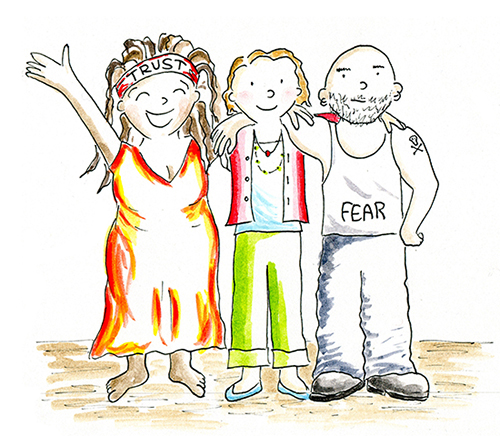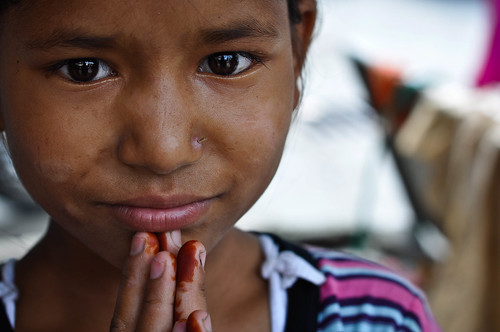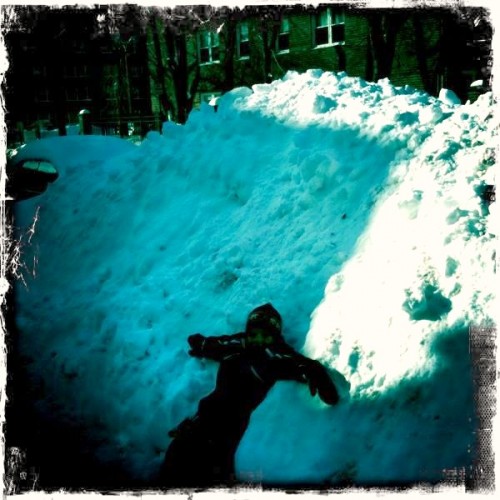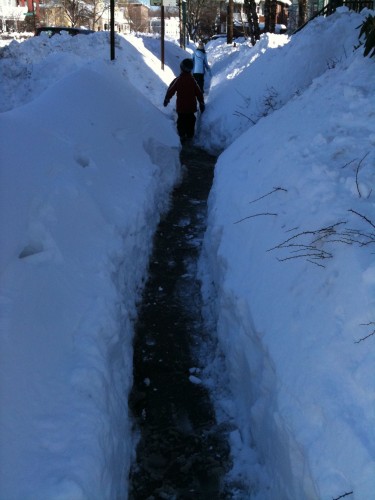It has been so much fun to feature the writing of some of my most treasured writers on the topic of trust. In fact, these are trusted writers, thinkers, and, in some cases, friends. What a joy!
In that classic universe taking charge of me way, once I chose Trust as my word of the year, I almost immediately stumbled my way onto Kristin Noelle’s beautiful site, Trust Tending. I was honored last week when Kristin interviewed me for Trust Tending, and found her questions thought provoking in what I’ve already come to recognize as her gentle, kind way. I asked Kristin to share some words for me here. Please enjoy Kristin’s thoughts on trust, and then head over to Trust Tending to explore. If you like what I write here, I’m certain you’ll find yourself at home among Kristin’s honest words and charming illustrations.

It’s 1979 and I’m standing aghast alongside fellow preschool friends, staring at the butterfly that my tricycle has unintentionally crushed. The fluid from its broken body is as yellow as the sun. My heart is broken, oozing too, and I’m sure I’ll be punished for this crime that I’ve committed.
And it’s 1982 and my school bus has deposited me home before my mother’s return from an errand. I have no key and, of far more importance to me, I’m terrified that my mom has disappeared. Or died. I weep when she rolls into the driveway, four minutes later.
And I’m eleven, picking my way to the front of a packed room of peers to receive a ribbon I assume is there for me. My name has just been called for a prize and I’m so focused on the maze of gangly limbs before me that I don’t notice that none of the other winners have left their seats. I reach the front and look expectantly at my teacher, note her empty hands and bemused expression, and make my way back to my seat. My head is aflame and the sound of my heart roaring.
All of us have scenes like these buried in our back closets – snapshots so intensely felt when they were taken that a glance at the mere box that contains them now is enough to kick us back into the kids we were when the events actually happened.
We don’t like to feel this way, though, so we go about our lives avoiding that box, and the feelings therein, as much as humanly possible. We try to “fake it ‘til we make it” in our courage and confidence departments. We envision fear as an animal we must tame, an enemy we must conquer, a nuisance we must ignore until it goes away.
And maybe such things work to achieve desired things: jobs, degrees, friendships, the satisfaction of having done one’s most feared thing.
What I’m most interested in, however, is an inner world of peace. And the more I try to push my fears away, the more wound-up I feel in side. The more brittle and tight. The more my tactics for facing challenges feel coercive and domineering (Alright, self: quit yer whining and DO IT already!!), rather than flowing from a comfortable, compassionate sense of strength.
So as I’ve thought about trust in recent years, and my deep wish for more of it, I’ve come to recognize fear not as an enemy of the kind of trust I want, but as one of my most helpful means for finding and growing it. I’ve come to see my box of intensely charged scenes – the ones about shame and loss and broken things – as precisely where to look when I feel afraid and want to find a way to live beyond my fear.
This is what I do: when I’m stuck or afraid, I intentionally open that box up. I shuffle through it, searching for the scene that makes me feel whatever shade of fear or shame I’m feeling now. I try to experience what happened there as an adult, alongside the girl (or teen, or even younger adult) that I was when it originally happened. And I extend as much support as I’m able to that younger self.
Something about seeing the roots of my fears for what they are and reinterpreting those experiences through the eyes of my present day self, with all the skills and experience I’ve gained since childhood for making sense of things: something about this heals me. It softens and strengthens me, both. It causes trust to grow alongside my fear, and sometimes (how I wish this were always the case!) my fears get completely uprooted in the process and I’m left only with the habit of avoiding them to break.
Trust, it seems to me, can be known and experienced only as profoundly as we’re able to see and acknowledge and honor our deepest fear.
 Thank you, Kristin! It’s a privilege to share your words and drawings here.
Thank you, Kristin! It’s a privilege to share your words and drawings here.







 Thank you,
Thank you,